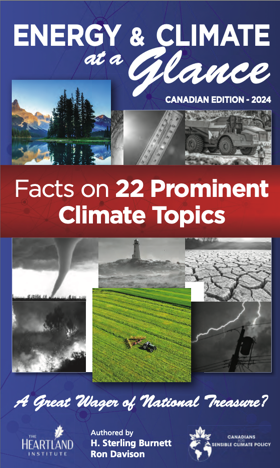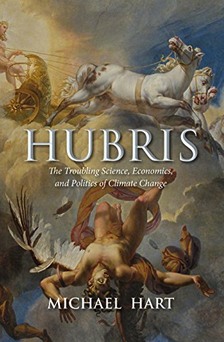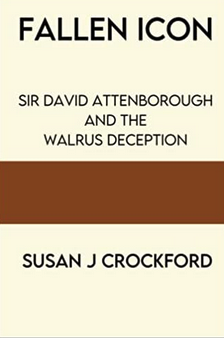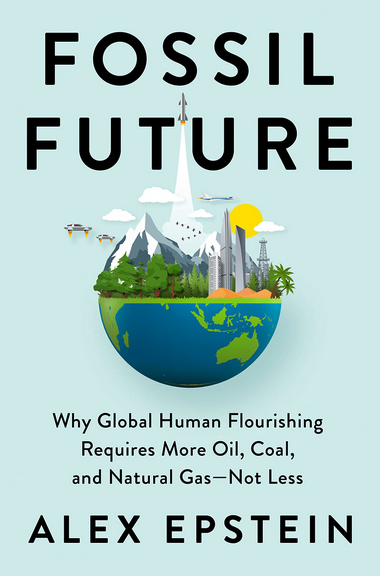Through the Looking Glass: A Do-It-Yourself Guide to Climate Science
By Paul MacRae

Through the Looking Glass takes readers deep into the ‘science’ of climate science to reveal the fanciful, Alice in Wonderland nature of its assumptions and conclusions—its ability to believe ‘six impossible things before breakfast.’
Readers can check for themselves—hence a ‘do-it-yourself’ guide—that temperature readings of the last seventy years do not match the increase in carbon-dioxide levels, with the result that climate models consistently over-predict ‘global warming’. In other words, carbon dioxide is not the ‘control knob’ of climate, as climate scientists wish us to believe.
Why has climate science strayed so far from reality? Because climate science is not traditional evidence-based science, as we are told. It is ‘post-normal’ science, based on ‘consensus’ and faulty computer models, both highly politicized to create a scary ‘global warming’ story for the public.
Readers will discover that the ‘warming’ of recent decades has been created not by increases in carbon-dioxide levels but by El Niño events, which ‘ratchet up’ global temperatures every few years. Outside of El Niño years, temperatures are basically flat-lined.
This means the trillions of dollars spent trying to stop ‘global warming’ by drastically reducing the use of fossil fuels will have almost no effect in lowering global temperatures. But the damage to our economic system will make us all poorer and less able to adapt to the weather events and climate changes that do occur—and have always occurred.
We, as citizens of democracies, can meekly accept this reduction of our lifestyles, based on highly politicized ‘post-normal’ science. Or, with the more balanced understanding of climate science this book provides, we can take political action—hence a ‘citizen’s guide’—to stop the ‘global-warming’ bandwagon before it takes us to a future that is poorer, less democratic, perhaps even totalitarian. The choice is ours.
This book is available on Amazon in print and e-editions as well as e-book outlets like Apple Books, Kobo, and others.
False Alarm: Global Warming Facts Versus Fears
by Paul MacRae

This book, by a veteran journalist (more than 35 years with The Canadian Press, Toronto Star, Toronto Globe and Mail, Bangkok Post, and Victoria Times Colonist) and teacher (15 years teaching business and professional writing at the University of Victoria), offers a readable, balanced and fact-based analysis of “apocalyptic global warming” claims promoted by climate alarmists.
Based on extensive research that is fully documented, MacRae finds that fears of catastrophic global warming are wildly exaggerated by environmental groups, the media, politicians and agenda-based scientists. False Alarm gives general readers all the information they need to form their own opinions in the face of a tidal wave of propaganda from climate alarmists.
False Alarm is available through Amazon in print, and in e-book format at Kobo, Apple iBooks, and other e-book retailers. You can read more about False Alarm, plus many of MacRae’s fact-based blogs on climate topics, at paulmacrae.com
Climate and Energy at a Glance: Facts on 22 Prominent Climate Topics

This 88-page book, published by Canadians for Sensible Climate Policy (CSCP) and The Heartland Institute, is a timely counter to the “Net Zero” push and outlines how that goal is unachievable by 2050, scientifically unnecessary, and will ensure lower standards of living with no appreciable environmental benefit.
It is available for $15 (Cdn) through the Friends of Science website.
Hubris: The Troubling Science, Economics, and Politics of Climate Change
By Michael Hart

Hubris explores problems and issues that have emerged in national and international discussion of policies to address climate change. It concludes that every solution put forward by the UN and activists poses more problems than might ever emerge from the marginal human impact on natural climate change.
Rather than mitigation, governments should focus on adaptation. As is, climate change discussions have become captive of a utopian agenda that is using climate change as a stalking horse to drive alarm in the hope that it will convince governments to act.
Apocalypse Never: Why Environmental Alarmism Hurts Us All
By Michael Shellenberger

An environmental crusader for several decades, Michael Shellenberger has authored or co-authored several books that are critical of alarmist environmental claims, including Break Through with Ted Nordhaus. In this excerpt from Apocalypse Never, Shellenberg shows the absurdity of claims that “climate change” is humanity’s “greatest challenge”:
In 2019, Bill McKibben pushed a new book, Falter, which argued that climate change is “the greatest challenge humans have ever faced.” It was a strong claim by America’s leading environmental writer and most influential climate leader. … As such, it is worth taking his claim seriously.
As we have seen, the death toll and damage from extreme [weather] events have declined 90 percent during the last century, including in poor nations. For McKibben’s argument to be true, that long, salutary trend will need reverse itself, and quickly.
And, for McKibben’s claim to be true, climate change must prove to a greater challenge than coping with the Black Death, which killed aboaut half of all Europeans, about fifty million people; the control of infectious diseases, which killed hundreds of millions; the great wars of Europe and the Holocaust, which killed more than 100 million people. …
And climate change must prove to be greater than all other contemporary challenges, from the monumental task of lifting one billion souls out of extreme poverty … to the battles and wars that killed tens of thousands of people last year [2020] in the Middle East and Africa.
Page 260
Shellenberger does a similar job in demolishing most of the other popular myths about the impending “climate change emergency” that isn’t.
Fallen Icon: Sir David Attenborough and the Walrus Deception
By Susan J. Crockford

Susan Crockford has spent her career as a scientist studying the evolution, populations, and behaviour of Arctic mammals. She has been treated unfairly by some of her colleagues for not joining in the alarmist narrative that polar bears are endangered with extinction due to climate change, when in fact the polar bear population in the Arctic is healthy and growing.
In her new book Susan chronicles the deceitful and unscrupulous way in which Sir David Attenborough has characterized the death of hundreds of walruses, claiming they committed suicide due to a lack of ice caused by global warning. The clear truth is that the walruses were being attacked by a pack of polar bears, not uncommon in the Arctic.
Thanks to Susan we now know the truth about Sir David’s shameless attempt to use the walrus deaths to support another myth, that there is a “climate emergency” that requires we effectively give up modern civilization altogether. —Patrick Moore, ecologist and Greenpeace founder
The Moral Case for Fossil Fuels
By Alex Epstein
Excerpt from this book:

Ultimately, when thinking about fossil fuels, we are trying to figure out the right thing to do, the right choices to make. But what exactly do we mean by right and wrong, good and bad? What is our standard of value? By what standard or measure are we saying something is good or bad, great or catastrophic, right or wrong, moral or immoral?
I hold human life as the standard of value, and I think that our fossil fuel use so far has been a moral choice because it has enabled billions of people to live longer and more fulfilling lives, and I think that the cuts proposed by the environmentalists of the 1970s were wrong because of all the death and suffering they would have inflicted on human beings.
Not everyone holds human life as their standard of value, and people often argue that things are right or wrong for reasons other than the ways they benefit or harm human beings. …
Many leading environmental thinkers, including those who predict fossil-fuel catastrophe, hold as their standard of value what they call “pristine” nature or wilderness—nature unaltered by man.
For example, in a Los Angeles Times review of The End of Nature, Bill McKibben’s influential book of 25 years ago predicting catastrophic climate change, David M. Graber, research biologist for the National Park Service, wrote this summary of McKibben’s message:
McKibben is a biocentrist, and so am I. We are not interested in the utility of a particular species or free-flowing river, or ecosystem, to mankind. They have intrinsic value, more value to me than another human body, or a billion of them. Human happiness, and certainly human fecundity, are not as important as a wild and healthy planet. I know social scientists who remind me that people are part of nature, but it isn’t true. Somewhere along the line—at about a billion [sic] years ago, maybe half that—we quit the contract and became a cancer. We have become a plague upon ourselves and upon the Earth. It is cosmically unlikely that the developed world will choose to end its orgy of fossil-energy consumption, and the Third World its suicidal consumption of landscape. Until such time as Homo sapiens should decide to rejoin nature, some of us can only hope for the right virus to come along.
In his book, McKibben wrote that our goal should be a “humbler world,” one where we have less impact on our environment and “Human happiness would be of secondary importance.”
What is of primary importance? Minimizing our impact on our environment. McKibben explains: “Though not in our time, and not in the time of our children, or their children, if we now, today, limited our numbers and our desires and our ambitions, perhaps nature could someday resume its independent working.” This implies that there should be fewer people, with fewer desires, and fewer ambitions. This is the exact opposite of holding human life as one’s standard of value. It is holding human non-impact as one’s standard of value, without regard for human life and happiness.
Fossil Future: Why Global Human Flourishing Requires More Oil, Coal, and Natural Gas—Not Less
By Alex Epstein
Book summary by Catherine Hill

The New York Times bestselling author of The Moral Case for Fossil Fuels draws on the latest data and new insights to challenge everything you thought you knew about the future of energy
For over a decade, philosopher and energy expert Alex Epstein has predicted that any negative impacts of fossil fuel use on our climate will be outweighed by the unique benefits of fossil fuels to human flourishing—including their unrivaled ability to provide low-cost, reliable energy to billions of people around the world, especially the world’s poorest people.
And contrary to what we hear from media “experts” about today’s “renewable revolution” and “climate emergency,” reality has proven Epstein right:
• Fact: Fossil fuels are still the dominant source of energy around the world, and growing fast—while much-hyped renewables are causing skyrocketing electricity prices and increased blackouts.
• Fact: Fossil-fueled development has brought global poverty to an all-time low.
• Fact: While fossil fuels have contributed to the 1 degree of warming in the last 170 years, climate-related deaths are at all-time lows thanks to fossil-fueled development.
What does the future hold? In Fossil Future, Epstein, applying his distinctive “human flourishing framework” to the latest evidence, comes to the shocking conclusion that the benefits of fossil fuels will continue to far outweigh their side effects—including climate impacts—for generations to come. The path to global human flourishing, Epstein argues, is a combination of using more fossil fuels, getting better at “climate mastery,” and establishing “energy freedom” policies that allow nuclear and other truly promising alternatives to reach their full long-term potential.
Today’s pervasive claims of imminent climate catastrophe and imminent renewable energy dominance, Epstein shows, are based on what he calls the “anti-impact framework”—a set of faulty methods, false assumptions, and anti-human values that have caused the media’s designated experts to make wildly wrong predictions about fossil fuels, climate, and renewables for the last fifty years. Deeply researched and wide-ranging, this book will cause you to rethink everything you thought you knew about the future of our energy use, our environment, and our climate.
